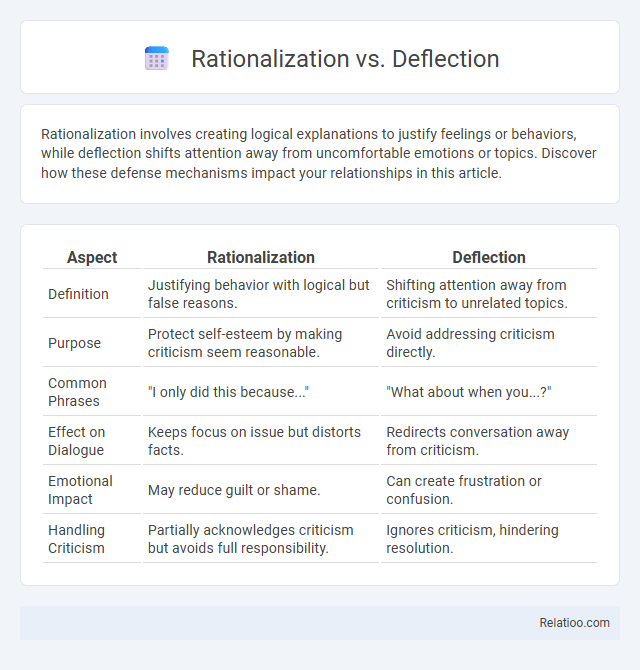Rationalization involves creating logical explanations to justify feelings or behaviors, while deflection shifts attention away from uncomfortable emotions or topics. Discover how these defense mechanisms impact your relationships in this article.
Table of Comparison
| Aspect | Rationalization | Deflection |
|---|---|---|
| Definition | Justifying behavior with logical but false reasons. | Shifting attention away from criticism to unrelated topics. |
| Purpose | Protect self-esteem by making criticism seem reasonable. | Avoid addressing criticism directly. |
| Common Phrases | "I only did this because..." | "What about when you...?" |
| Effect on Dialogue | Keeps focus on issue but distorts facts. | Redirects conversation away from criticism. |
| Emotional Impact | May reduce guilt or shame. | Can create frustration or confusion. |
| Handling Criticism | Partially acknowledges criticism but avoids full responsibility. | Ignores criticism, hindering resolution. |
Understanding Rationalization: Definition and Examples
Rationalization is a psychological defense mechanism where individuals create logical explanations to justify unacceptable behaviors or feelings, protecting their self-esteem from distress. Common examples include blaming external factors for personal mistakes or minimizing the impact of harmful actions to avoid guilt. Understanding rationalization helps differentiate it from deflection, which shifts blame to others, and provides insight into how people cope with cognitive dissonance.
What is Deflection? Key Concepts Explained
Deflection is a psychological defense mechanism where an individual redirects attention from uncomfortable feelings or criticism toward another person or situation, avoiding personal accountability. Key concepts include shifting blame, evading responsibility, and minimizing one's role in conflicts or problems. Unlike rationalization, which justifies behavior with logical reasons, deflection distorts focus to protect self-esteem by externalizing issues.
Psychological Roots of Rationalization
Rationalization originates from the psychological defense mechanism where Your mind unconsciously justifies or explains controversial behaviors or feelings to preserve self-esteem and reduce anxiety. It differs from deflection, which shifts blame or focus away from oneself to avoid accountability, while projection attributes one's own undesirable traits to others. Understanding these distinctions clarifies how cognitive processes attempt to protect Your self-identity during internal conflict.
The Mechanisms Behind Deflection
Deflection involves shifting blame or attention away from oneself to avoid responsibility, often by redirecting criticism toward others. This mechanism differs from rationalization, which justifies behaviors with seemingly logical reasons, and denial, which outright rejects reality. Understanding deflection helps you recognize when conversations are diverted to evade accountability, enhancing emotional intelligence and communication.
Rationalization vs Deflection: Core Differences
Rationalization involves creating logical explanations to justify behaviors or feelings, often to protect self-esteem or avoid guilt. Deflection shifts attention away from oneself by redirecting blame or focus onto others, preventing accountability. The core difference lies in rationalization's internal justification versus deflection's external redirection of responsibility.
Common Scenarios: When People Rationalize vs Deflect
People commonly rationalize by creating logical explanations to justify behavior or decisions that may be questionable, often to protect self-esteem or reduce cognitive dissonance. In contrast, deflection occurs when individuals shift attention away from themselves or their actions, typically by blaming others or external circumstances to avoid accountability. Rationalization frequently appears in personal failures or mistakes, while deflection is more common in conflict situations where admitting fault may threaten social standing.
Impacts on Relationships and Communication
Rationalization, deflection, and denial each impact relationships and communication differently by shaping how individuals process and express emotions or accountability. Rationalization can lead Your partner or colleagues to feel misunderstood or invalidated when reasons mask true feelings or mistakes, while deflection shifts focus away from core issues, causing frustration and breakdowns in honest dialogue. Denial, by refusing to acknowledge reality, often creates barriers to trust and resolution, preventing effective communication and deeper connection within relationships.
How Rationalization and Deflection Affect Personal Growth
Rationalization creates false justifications that hinder your ability to face reality and learn from mistakes, limiting personal growth by preventing genuine self-awareness. Deflection shifts blame onto others, avoiding responsibility and blocking the development of accountability and emotional maturity. Both mechanisms obstruct introspection and delay progress by disrupting honest self-evaluation and growth.
Identifying Rationalization and Deflection in Everyday Life
Rationalization involves creating logical but false reasons to justify behavior, such as blaming external circumstances for personal mistakes, while deflection shifts attention away from oneself, often by redirecting criticism or responsibility onto others. Identifying rationalization includes recognizing excuses that mask true motives, whereas spotting deflection requires noticing when someone avoids accountability by changing the subject or blaming outside factors. Awareness of these defense mechanisms enables clearer understanding of communication patterns and promotes honest self-reflection in interpersonal interactions.
Strategies to Overcome Rationalization and Deflection
Strategies to overcome rationalization and deflection include increasing self-awareness through reflective journaling and mindfulness practices, which help identify and challenge distorted cognitive patterns. Cognitive-behavioral techniques like thought records and Socratic questioning encourage individuals to confront uncomfortable truths by examining evidence objectively. Building emotional resilience and seeking feedback from trusted peers or therapists also diminish reliance on defense mechanisms, fostering personal accountability and authentic problem-solving.

Infographic: Rationalization vs Deflection
 relatioo.com
relatioo.com